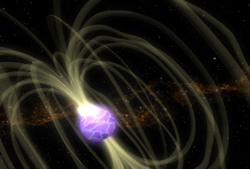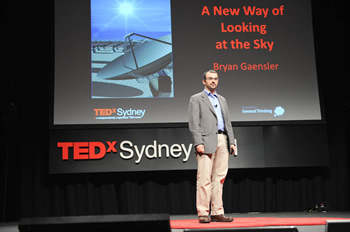
Professor Gaensler is an astronomer best known for his work on magnetars, supernova remnants and magnetic fields.
My career highlight was getting to be in the box seat for the brightest explosion ever observed in human history, the "hyperflare" from magnetar SGR 1806-20 that we saw in December 2004. This was a once-in-a-lifetime event that has taught us so much about violent explosions and their aftermath, and it unfolded before our very eyes Normally you decide what you want to work on in a given week or month, but this event blasted the entire planet and took us all by surprise.

Fifty years ago, neutron stars (which I've pursued for much of my career) hadn't even been discovered yet. So anyone who thinks they know what the hot topics in astronomy will be in 50 years is almost certainly wrong. I suspect that in 50 years all the big questions of today will have been solved, and there will be whole new problems in astronomy that we don't even know are problems yet.
My two inspirations are astronomer Carl Sagan and Australian cricketer Allan Border. Carl Sagan because he was not just a scientific genius, but because he was indescribably eloquent – he explained why science mattered and why he was so passionate about it. Allan Border for opposite reasons – he became an all-time great not through elegance or style, but through sheer bloody-mindedness, grit and hard work. The two powerful motivating forces in my career have been the value of hard work, and the need to convey to the general public the beauty and wonder of science.
I was fortunate to have a very inspirational science teacher, Dr Michael Bishop. Michael inspired not just me but a whole generation of young scientists, because he took us way way beyond the dry curriculum, and into the realm of real research, unsolved questions and discovery. Thanks to Michael, I went from a lover of science to a committed scientist, and for this I dedicated my PhD thesis to him.

Modern astronomy is all about massive data sets and sophisticated algorithms. The great discoveries of the future will not be about pretty pictures of glowing nebulae, but will be needles in haystacks, uncovered through subtle statistics. So don't just pursue astronomy and physics, but also aim to become an expert in computer science – the modern astronomer needs to be able to write programs and scripts (it doesn't really matter which particular programming language you learn), and to be able to manipulate complex images and tables.
I am a huge science fiction fan, so it's hard to pick a single favourite. But I do highly recommend the books of Alastair Reynolds, who has a PhD in astrophysics and worked as a research scientist before moving into full-time writing. His work is incredibly creative, but backed by the solid understanding and insight of a real physicist. His book "Pushing Ice" is an absolute masterpiece and probably the best thing I have ever read.
© 2025 Australian Academy of Science